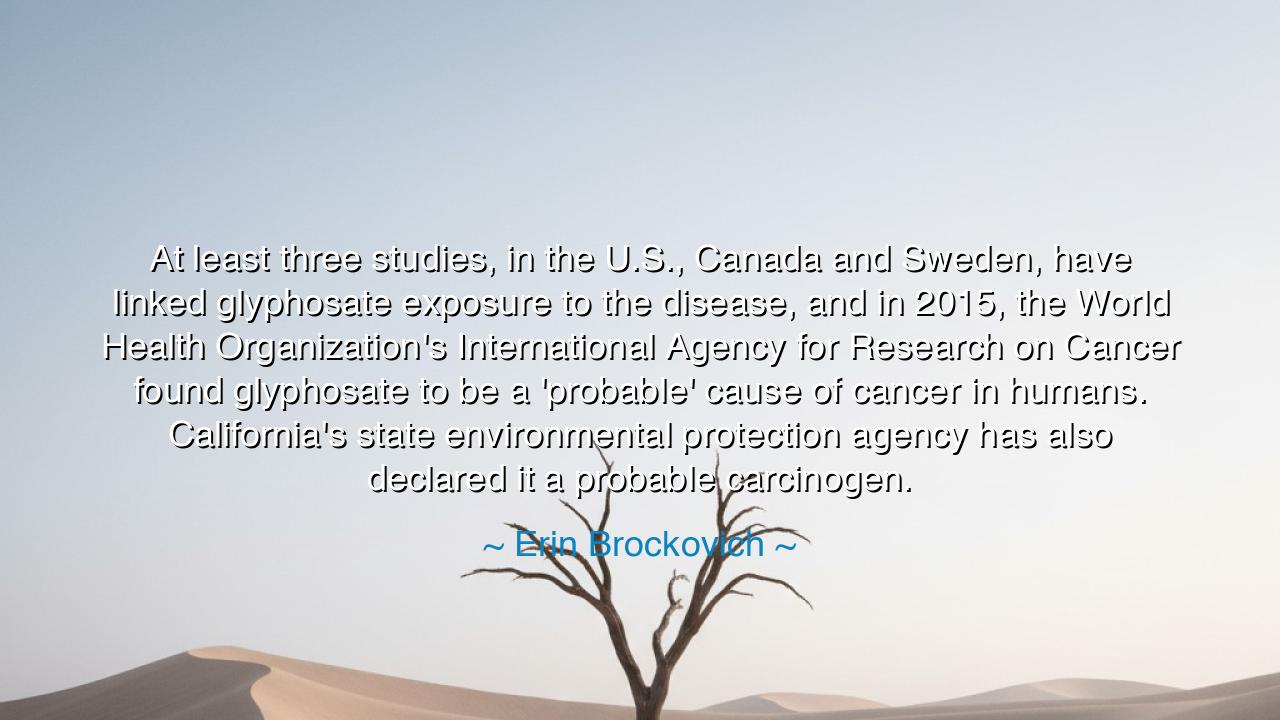
At least three studies, in the U.S., Canada and Sweden, have
At least three studies, in the U.S., Canada and Sweden, have linked glyphosate exposure to the disease, and in 2015, the World Health Organization's International Agency for Research on Cancer found glyphosate to be a 'probable' cause of cancer in humans. California's state environmental protection agency has also declared it a probable carcinogen.






Hear now the words of Erin Brockovich, the tireless sentinel who stood against the poisoning of the people: “At least three studies, in the U.S., Canada, and Sweden, have linked glyphosate exposure to the disease, and in 2015, the World Health Organization’s International Agency for Research on Cancer found glyphosate to be a ‘probable’ cause of cancer in humans. California’s state environmental protection agency has also declared it a probable carcinogen.” This declaration is not the voice of idle speculation, but the solemn trumpet of alarm, sounded after years of watching silence cloak the dangers of profit-driven industry. It is both testimony and warning, a call to awaken from slumber and see that what nourishes the field may, in turn, poison the body.
The heart of these words lies in the name glyphosate—a chemical spread across the earth in the guise of agricultural salvation. It is the weapon in the hand of modern farmers, praised for slaying weeds, yet accused of sowing unseen sickness in humankind. Studies from three lands—America, Canada, and Sweden—have sounded the alarm, linking the substance to the rise of disease. The World Health Organization, bearer of global authority, has spoken with grave caution, naming it a probable carcinogen. And even the guardians of California, a land long tested by battles for environmental justice, have echoed this verdict. Thus, the evidence does not spring from one mouth but from a chorus across nations.
This tale is not new. Recall the saga of asbestos, once hailed as a miracle fiber, woven into homes and factories, celebrated for its strength and resistance to fire. For decades, men worked with it, unaware that every breath carried death into their lungs. Only after countless lives were consumed by mesothelioma did the world admit what had been whispered by scientists long before. Just as asbestos cloaked its deadly truth in utility, so does glyphosate hide behind the promise of abundant harvests, its danger revealed only when the veil of profit is pierced by courage and investigation.
Erin Brockovich herself is no stranger to such battles. She rose not with title or authority, but with relentless spirit, uncovering the poisoning of water by hexavalent chromium in Hinkley, California. There, the people drank deeply of contamination, until justice rang forth through her persistence. Her name has become a banner for those who fight the hidden toxins of industry, and her words about glyphosate carry the weight of lived struggle: they are not cold reports, but the fire of truth spoken by one who has seen lives broken by corporate deceit.
The lesson is clear: never accept blindly what is sold as safe. Studies must be heeded, not silenced. Science must be honored, not bent to the will of profit. When powerful voices—from the World Health Organization to state guardians—declare danger, it is no longer the time for doubt, but the time for vigilance. To ignore such warnings is to repeat the mistakes of history, letting the thirst for wealth outweigh the value of life.
What then shall we do? As citizens, demand transparency in the food you eat and the fields that grow it. Support laws that test and regulate chemicals, even when industry resists. Grow what you can with your own hands, seek organic produce where possible, and lend your voice to those who fight for stronger protections. And above all, do not be lulled into silence when warnings rise around you—speak, as Brockovich spoke, for silence is the ally of poison.
In your daily life, small acts matter. Read the labels of what you buy. Ask your leaders where they stand on environmental protections. Join hands with neighbors to push for healthier schools, safer parks, and cleaner water. For the defense of life is not the burden of the few, but the sacred duty of all.
Thus, remember Erin Brockovich’s words: glyphosate is not merely a matter of crops and weeds, but of life and death. Let her voice, joined by the voices of scientists and defenders across the world, be your guide. Choose vigilance, choose justice, choose the path that protects the earth and the generations yet unborn. For in this struggle, as in all struggles of truth against power, the victory belongs not to those who poison, but to those who refuse to look away.






AAdministratorAdministrator
Welcome, honored guests. Please leave a comment, we will respond soon